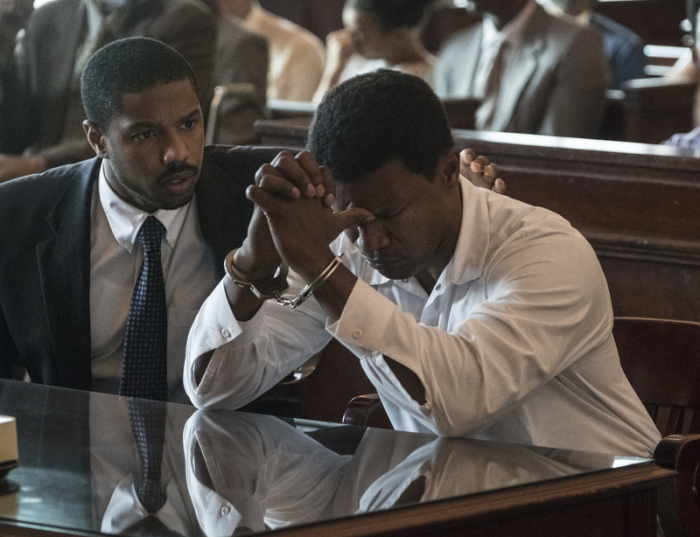'Just Mercy' review: Film reflects biblical values, Jesus' 'unmerited grace'

In 1987, Alabaman logger Walter “Johnny D.” McMillian was arrested for a murder he didn’t commit. Due to incompetencies and racism within the justice system in Alabama, McMillian was sentenced to death a few years later — though his entire case was based on a single, coerced testimony.
Enter Bryan Stevenson, a brilliant, Harvard-educated attorney who moves from Delaware to the deep South to defend death row inmates and exonerate the wrongly accused. Facing politically-motivated maneuverings and structural racism himself, Stevenson takes on the seemingly impossible challenge of securing freedom for McMillian.
Opening over the weekend, "Just Mercy" (PG-13) stars Jamie Foxx as McMillian and Michael B. Jordan as Stevenson. Directed and co-written by Destin Daniel Cretton, the film is a powerful, sobering reminder that — as Stevenson so eloquently states — “we all need some measure of unmerited grace.”
In addition to McMillian, "Just Mercy" highlights several real-life cases of men wrongly sentenced to death and raises wider questions about the U.S. justice system, mass incarceration, and excessive punishment. The Equal Justice Institute, the organization started by Stevenson, claims that for every nine people who are executed, one person on death row has been exonerated.
At first, McMillian refuses Stevenson’s help, believing the racism rooted deeply within the Alabama justice system will ensure he remains on death row. His family reveals to Stevenson that other lawyers, under the guise of helping, have taken money from Johnny D’s wife, Minnie (Karan Kendrick), without actually fighting for his freedom.
With little support, Stevenson and his colleagues, including Eva Ansley (Brie Larson), work to establish Johnny D’s alibi — he was at a church fish fry that day along with several witnesses — and challenge the testimony of a shifty witness (Tim Blake Nelson).
But Stevenson also faces larger, more imposing giants, including sheriff (Michael Harding) who led the investigation, and the complacent new district attorney (Rafe Spall), who cares more about his reputation than finding the truth. He’s not just fighting for McMillian; he’s challenging a system deeply rooted in slavery and Jim Crow.
At times, "Just Mercy" is difficult to watch: The film includes a discussion of various crimes and scenes of troubling racism. In one scene, Stevenson is pulled from a car while a police officer points a gun at him. In another, he is stripped down and searched before entering the prison — purely to humor a particularly contemptuous guard. The movie’s most troubling scene, however, involves a man being placed in an electric chair, although his actual death isn’t shown.
It’s made known in the film that McMillian was targeted by authorities because of an affair he had with a white woman, an act that is clearly painful for Minnie and their children. Additionally, the phrase “sexually abused” is mentioned.
There are several coarse words littered throughout the film, as well.
Yet, religious and spiritual themes are widely sprinkled throughout "Just Mercy." Inmates cling to their faith on death row and sing hymns. Stevenson — who previously told CP his advocacy work is rooted in his faith — is shown praying with an inmate, and several characters attend church.
Additionally, the biblical themes of mercy, grace, and redemption drive the true story, reflected in Stevenson’s dedication to Micah 6: “And what does the LORD require of you? To act justly and to love mercy and to walk humbly with your God.”
With strong performances and powerful visuals, "Just Mercy" is a beautifully-constructed film that calls on the viewer to reckon with their own presupposed ideas about justice, grace, and who, exactly, is deserving of mercy.
And although difficult at times, familiarizing ourselves with stories like McMillian’s is necessary and reckoning with our own prejudices will “ultimately motivate us to find a way forward” — at least, that’s Stevenson’s prayer.
“It’s important for us to get closer to people who have been excluded, oppressed, or marginalized because too often we try to create solutions to problems from a distance, and the solutions don't work because they haven't been shaped by what you learn when you're up close,” he told CP. “We can't be indifferent to the suffering of other people. We can't become blind to the needs of other people.”
The film runs 137 minutes and is now showing at theaters nationwide. It's rated PG-13 for mature thematic material including some racial epithets.




























